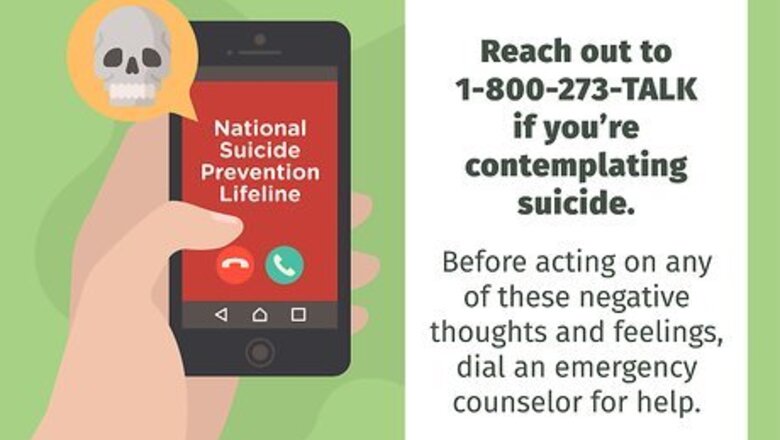
views
Using a Phone Hotline
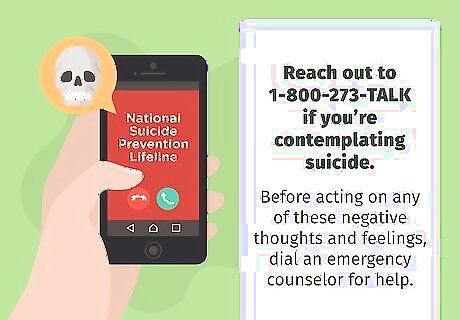
Reach out to 1-800-273-TALK if you’re contemplating suicide. This current outbreak has left countless people feeling alone and isolated, which is completely normal. Before acting on any of these negative thoughts and feelings, dial an emergency counselor for help. Through the National Suicide Prevention Lifeline hotline, a trained professional can help talk you through some of your struggles and remind you that there’s a light at the end of the tunnel. Check this site for a hotline in your country: http://www.suicide.org/international-suicide-hotlines.html. There are countless people who you’ve positively impacted that care about you and would miss you if you chose to end your life.
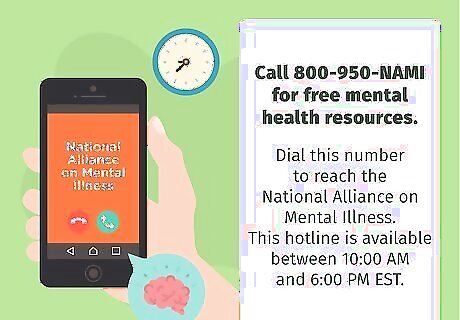
Call 800-950-NAMI for free mental health resources. With all of the sickness in the world right now, it may be difficult to get in-person help for your mental health needs. Dial this number to reach the National Alliance on Mental Illness, and see if you can speak to a volunteer or counselor about what’s on your mind. If you don’t feel like talking, you can also email [email protected] and ask for some digital mental health resources you can use. This hotline is available between 10:00 AM and 6:00 PM EST. If you’re in immediate danger or having a crisis, you may want to call a crisis hotline instead.
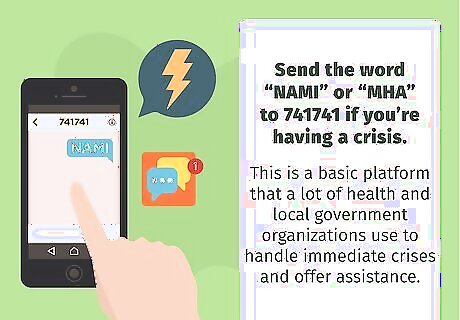
Send the word “NAMI” or “MHA” to 741741 if you’re having a crisis. If your phone plan allows it, save “741741” in your phone as a contact. This is a basic platform that a lot of health and local government organizations use to handle immediate crises and offer assistance. Text “NAMI” or “MHA” to get in contact with a counselor from the National Alliance on Mental Illness or the Mental Health America organization, who can talk you through your feelings and offer constant support. Check your local government’s website to see if they have a specific text hotline. Some areas have an abbreviation you can text to 741741, which will connect you with local support. Go to this site for international crisis texting options: https://www.crisistextline.org/about-us/where-we-are/#where-we-are2.
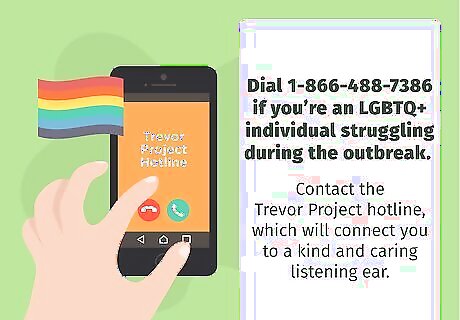
Dial 1-866-488-7386 if you’re an LGBTQ+ individual struggling during the outbreak. This period of quarantine can feel really isolating and lonely if you’re a member of the LGBTQ+ community, especially if you haven’t come out to your friends and family. You’re not alone in your struggles, and there are counselors available who would love to help you. Contact the Trevor Project hotline, which will connect you to a kind and caring listening ear. If you don’t want to speak with someone, you can text “START” to 678678 to speak with someone via text. The Trevor Project website has a live chat feature where you can talk to someone right away. You can find it here: https://www.thetrevorproject.org/get-help-now/ The TrevorSpace website is an international website where LGBTQ+ individuals all over the world can connect and provide solace to one another. You can join here: https://www.trevorspace.org.
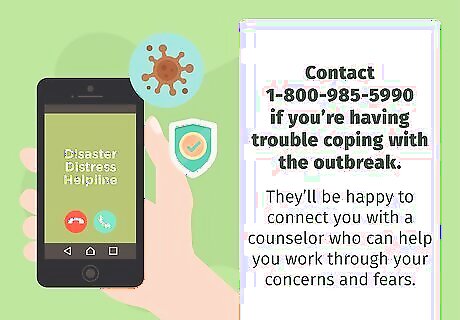
Contact 1-800-985-5990 if you’re having trouble coping with the outbreak. It can be really overwhelming to deal with the COVID-19 outbreak on a day-to-day basis, especially if you know affected people or live in a hotspot. Your feelings are completely normal, and are nothing to be ashamed of. Call the Disaster Distress Helpline—they’ll be happy to connect you with a counselor who can help you work through your concerns and fears. You can also text “TalkWithUs” to 66746 if you don’t want to talk on the phone.
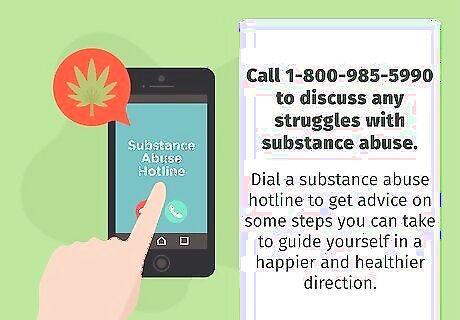
Call 1-800-985-5990 to discuss any struggles with substance abuse. Don’t be ashamed if you’ve picked up a few bad habits during the outbreak. Many people are struggling with isolation and quarantining in different ways, and you’re not alone in your coping mechanisms. Dial a substance abuse hotline to get advice on some steps you can take to guide yourself in a happier and healthier direction. Alcoholism and drug use are really common issues during a big crisis like the COVID-19 outbreak. Once the quarantining and stay-at-home orders are lifted, you can always join an Alcoholics or Narcotics Anonymous group to help you transition back to normal life.
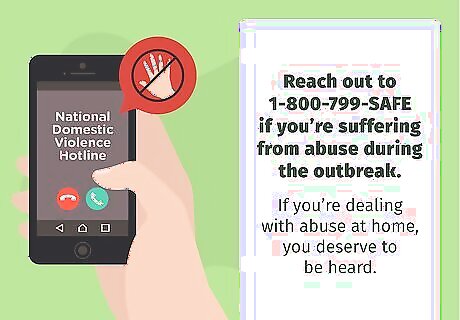
Reach out to 1-800-799-SAFE if you’re suffering from abuse during the outbreak. If you’re dealing with abuse at home, you deserve to be heard. The National Domestic Violence Hotline can offer comfort and advice, and help guide you in a more positive direction. Try to be as open with the counselor or operator as you can, so they can help you take action in moving you to a safe place. There are also hotlines for more specific issues, like elder abuse. Check out this site for more info: https://www.domesticshelters.org/resources/national-global-organizations.
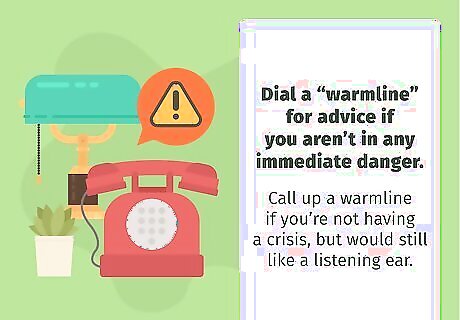
Dial a “warmline” for advice if you aren’t in any immediate danger. Call up a warmline if you’re not having a crisis, but would still like a listening ear. Many communities and towns have specific numbers where you can call and speak with a friendly peer or counselor. For a directory of warmlines in the United States, check here: https://www.nami.org/NAMI/media/NAMI-Media/BlogImageArchive/2020/NAMI-National-HelpLine-WarmLine-Directory-3-11-20.pdf.
Finding a Psychologist or Psychiatrist
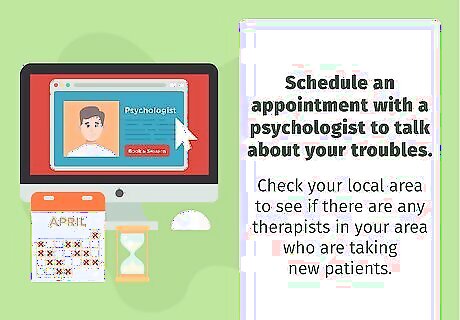
Schedule an appointment with a psychologist to talk about your troubles. Check your local area to see if there are any therapists in your area who are taking new patients. Set up an appointment in your free time where you can be open about your personal struggles during the outbreak. Some local governments offer mental health support, which you can find on their official website. Some therapists will take insurance, while others may not. It usually depends on the practice.Tip: If you're in the United States, you can find behavioral health treatment services here: https://findtreatment.samhsa.gov/.
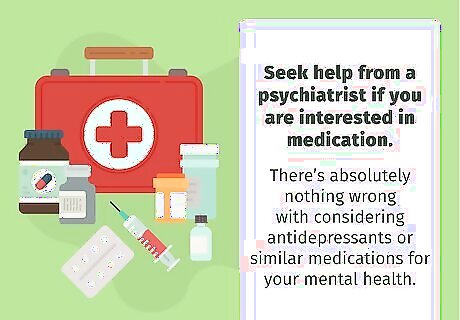
Seek help from a psychiatrist if you are interested in medication. There’s absolutely nothing wrong with considering antidepressants or similar medications for your mental health. Check online and schedule a telephone or virtual appointment with a psychiatrist, who can help you figure out your options. Ask the psychiatrist’s office about different payment options, and if they accept insurance or not. You may want to sign up for 90-day refills instead of 30-day refills, if you’re given the option.
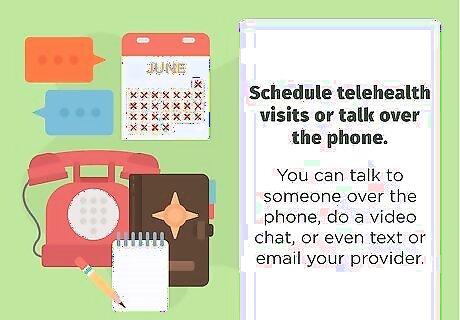
Schedule telehealth visits or talk over the phone. Because of the social distancing rules in place in many areas, you may not be able to go into a mental health professional's office to see them. However, that doesn't mean you can't get help! You can talk to someone over the phone, do a video chat, or even text or email your provider. Speak to them to see what communication method they prefer and arrange an appointment. Some organizations are dedicated to providing help over the phone, like this one: https://screening.mhanational.org/content/e-psychiatry-telepsych. Online groups like 7 Cups of Tea, BetterHelp, and TalkSpace offer online therapy sessions. Most of these organizations charge weekly, with rates starting at $35 per week. Some groups, like 7 Cups of Tea, also offer a few free services.
Exploring Online Resources
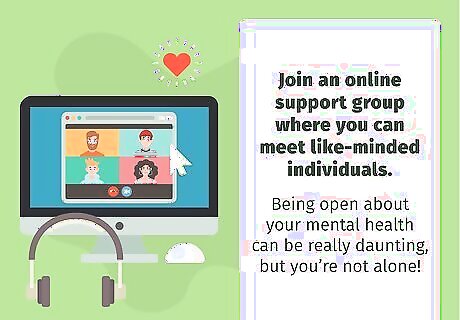
Join an online support group where you can meet like-minded individuals. Register on a digital support website, where you can go into more detail on some of the mental health issues you’ve been struggling with. Being open about your mental health can be really daunting, but you’re not alone! Once you join one of these communities, you can see how many people are going through something really similar. You’re never alone in your feelings of anxiety, isolation, and depression. Countless people suffer from mental health issues all over the world, and really understand what you’re going through. Some sites you can visit are: SupportGroups.com, For Like Minds, 18percent, 7cups, Emotions Anonymous, Support Group Central, and Psych Central.
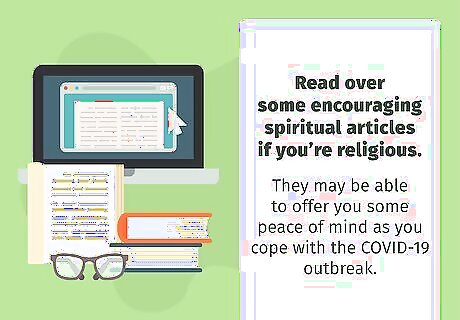
Read over some encouraging spiritual articles if you’re religious. Spirituality and religion aren’t for everyone, but they may be able to offer you some peace of mind as you cope with the COVID-19 outbreak. You may find comfort in connecting with other spiritual people online, or digitally attending spiritual services and gatherings. Check the website of your local church, synagogue, mosque, or other place of worship to see if they’re live-streaming their services. For instance, this article offers a lot of insight on how to take care of yourself and those around you in a spiritual way: https://hds.harvard.edu/life-at-hds/religious-and-spiritual-life/caring-self-others-times-trouble-spiritual-tools-tips.
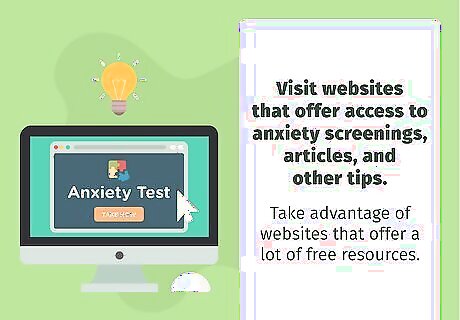
Visit websites that offer access to anxiety screenings, articles, and other tips. You’re definitely not alone in feeling anxious or depressed during the outbreak. Thankfully, there are easy ways to manage your negative emotions and thoughts. Take advantage of websites that offer a lot of free resources, along with articles and tips on managing your mental health and living life to the fullest. Dealing with severe emotions and thoughts can be debilitating. The American Psychological Association offers a step-by-step guide in helping you get out of this mental rut: https://www.apa.org/topics/resilience. Access Mental Health America's screening tools at https://screening.mhanational.org/screening-tools. The National Mental Health Consumers’ Self-Help Clearinghouse offers a lot of free aid and resources to people suffering from mental illness: http://www.cdsdirectory.org.
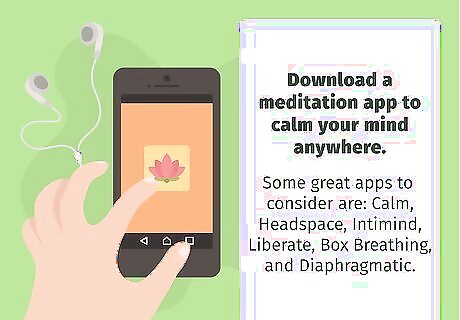
Download a meditation app to calm your mind anywhere. Search the app store on your phone and look for a meditation app that’s right for you. A lot of these programs are free, and can guide you through deep breathing and other exercises that help clear your mind. Try to get in the habit of using this type of app at least once a day. Some great apps to consider are: Calm, Headspace, Intimind, Liberate, Box Breathing, and Diaphragmatic.
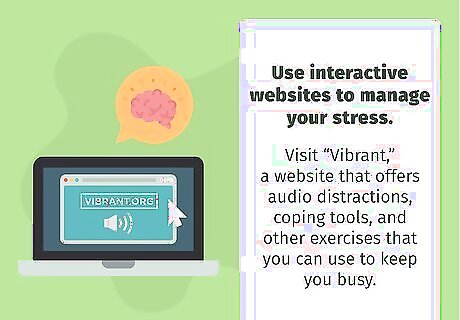
Use interactive websites to manage your stress. Visit “Vibrant,” a website that offers audio distractions, coping tools, and other exercises that you can use to keep your busy. You can also use a digital “Hope Box” on this site, which encourages you to look to the future in a positive way. Your anxiety, depression, and other negative feelings won’t go away overnight, which is completely normal. Instead of focusing on these feelings, it may help to distract yourself instead. You can access the Vibrant website here: https://www.vibrant.org/safespace.
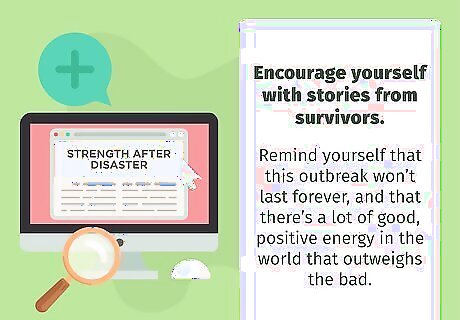
Encourage yourself with stories from survivors. Remind yourself that this outbreak won’t last forever, and that there’s a lot of good, positive energy in the world that outweighs the bad. Visit the “Strength After Disaster” website to read the accounts of people who are dealing with COVID-19, as well as people who have lived through all kinds of natural disasters and bad times. Anxiety, depression, and other mental health issues can feel really isolating, but positive stories can help remind you that you’re not alone. Check out Mental Health America's road to recovery resources here: https://mhanational.org/recovery-support.
Reaching out In Person
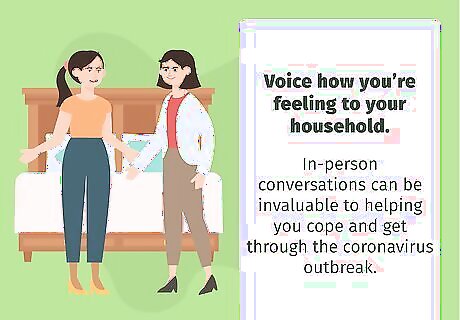
Voice how you’re feeling to your household. If you feel safe and comfortable, ask a trusted loved one or roommate if you can speak to them privately. Mention your concerns and any negative feelings you’ve been having, along with any negative changes in your mental health. In-person conversations can be invaluable to helping you cope and get through the coronavirus outbreak. You may not feel safe or comfortable sharing your feelings with a family member, which is completely normal. If you don’t feel comfortable talking about your feelings, consider keeping a journal instead.
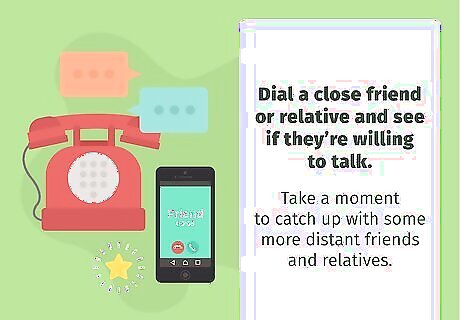
Dial a close friend or relative and see if they’re willing to talk. Take a moment to catch up with some more distant friends and relatives. Talk about how you’ve been coping throughout the outbreak, and be honest about any changes in your mental health. It takes a lot of courage to be open about your personal struggles, but these kinds of conversations may help you feel less isolated. There’s a good chance that your friends and family members are dealing with the same thoughts and feelings that you are.
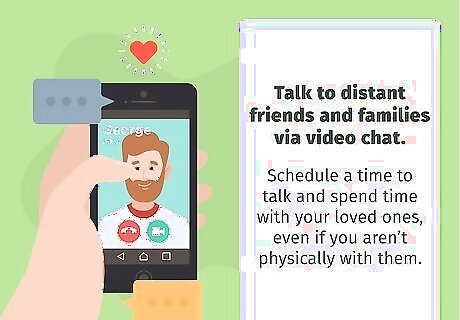
Talk to distant friends and families via video chat. Check and see if your distant friends and relatives have access to Zoom, Skype, FaceTime, or some other form of video chat. Schedule a time to talk and spend time with your loved ones, even if you aren’t physically with them. Talk about how you’re feeling—you may find a lot of solace in sharing and lifting your concerns to others. If you don’t have time to video chat, social media is a great alternative for keeping in touch.















Comments
0 comment